BIG STORY
Adamawa Guber Poll: Fintiri Floors Binani, INEC Takes REC’s Case To Buhari
Published
2 years agoon

The Returning Officer for the Adamawa State governorship election, Prof Mohammed Mele, on Tuesday, declared Governor Ahmadu Fintiri, the winner of the state governorship poll.
Fintiri secured a second term in office having scored 430,861 votes to beat the rival All Progressives Congress candidate, Aisha Dahiru, popularly known as Binani, who amassed 398,788 votes.
Also on Tuesday, the Independent National Electoral Commission said it had asked the Secretary to the Government of the Federation, Boss Mustapha, to draw the attention of “the appointing authority’’ to the behaviour of the state Resident Electoral Commissioner, Hudu Yunusa-Ari.
Fintiri’s victory took place 48 hours after Binani was controversially declared the governor-elect by Yunusa-Ari.
Binani was trailing Fintiri by over 31, 000 votes in the first round of the election held on March 18.
The electoral agency had declared the exercise inconclusive because the margin of lead did not exceed the number of cancelled votes in 69 polling units with 37, 016 voters.
The collation of results of the April 15 supplementary election was going on when the REC took over the duty of the returning officer and announced the APC candidate as the winner sparking an uproar.
In response, INEC promptly declared his action null and void and also summoned the REC and his colleagues in the Adamawa State office to Abuja.
The commission in a letter by the Secretary to the Commission, Rose Oriaran-Anthony further barred Yunusa-Ari from coming to the office and directed the Administrative Secretary to take charge of the INEC office in the state.
Mele at the resumed collation of the results on Tuesday pronounced Fintiri as the election winner to a wild jubilation by the anxious residents of the state.
The event was witnessed by the INEC National Commissioner and Chairman of the Information and Voter Education Committee, Festus Okoye.
Announcing the winner, the returning officer said, “Ahmadu Fintiri, having satisfied the requirement of the law, is hereby returned duly re-elected.”
The total number of registered voters was 2,196, 566 while the accredited voters were put at 876,387.
The returning officer said the valid votes were 853,819, rejected votes, were 15,287 and the total votes cast were 869,106.
Yunusa-Ari’s conduct
Giving an update on Yunusa-Ari’s unethical conduct after a meeting of its management comprising national commissioners and the INEC Chairman, Mahmood Yakubu, in Abuja on Tuesday, the electoral umpire requested the SGF to call the attention of “the appointing authority’’ to the unwholesome behaviour of the REC for further action.
Under the constitution, the appointing authority refers to the President who is empowered to appoint INEC commissioners as provided by section 154 (1) of the 1999 Constitution.
The section provides that: “Except in the case of ex officio members or where other provisions are made in this Constitution, the chairman and members of any of the bodies so established shall, subject to the provisions of this Constitution, be appointed by the President and the appointment shall be subject to confirmation by the Senate.’’
To remove a REC, the President can only act on an address by a two-thirds majority of the Senate in accordance with section 6(3) of the Electoral Act, 2022.
Disclosing the decisions reached the meeting on its official Twitter handle, the INEC said, “At its meeting today, April 18, 2023, the commission discussed matters arising from the Adamawa governorship election and decided to:
“Write to the Inspector-General of Police for the immediate investigation and possible prosecution of the Resident Electoral Commissioner for Adamawa State, Barrister Hudu Yunusa-Ari.
“Request the Secretary to the Government of the Federation to draw the attention of the appointing authority to the unwholesome behaviour of the REC for further action.
“The collation process shall resume at a time to be determined by the returning officer.’’
In line with the INEC resolution, the Nigeria Police Force has promised to probe the incident at the Adamawa collation centre in collaboration with the electoral electoral commission.
Responding to an inquiry by our correspondent on Tuesday, the Force Public Relations Officer, Olumuyiwa Adejobi, noted that the police had yet to receive the letter from INEC, adding that the police will, however, collaborate with the electoral umpire to investigate the matter.
He further noted that the IGP had ordered the immediate redeployment of the Commissioner of Police on election duty in Adamawa State, Mohammed Barde from the state, and ordered that the CP in charge of Gombe State, Etim Equa, immediately proceed to Adamawa.
Adejobi said, “We have not received any letter (from INEC), but we will carry out a thorough investigation on the Adamawa incident in collaboration with the INEC. So, if INEC sends in any letter, we will treat it as recommended as well.
“Also, the IGP has ordered the redeployment of the CP-election, Adamawa, and replaced him with CP Gombe, Etim Oqua, who has been directed to proceed to Yola immediately for the conclusion of the guber election process in Adamawa. We are committed to having a more secure and successful process in Adamawa.”
In a new development, the Federal High Court sitting in Abuja on Tuesday refused to entertain an ex-parte application brought before it by Binani.
The defendants in the suit are the INEC, PDP and Fintiri.
In the ex-parte application filed by her lawyer, Mohammed Sheriff, the APC candidate was asking the court to determine whether the INEC can take any further steps on the declared governorship election results made by the Adamawa REC.
Abuja court
However, when the ex parte motion was about to be moved, Justice Inyang Ekwo cut in and asked Binani’s lawyer first to address him if his court had jurisdiction to entertain such a matter.
He subsequently asked the lawyer to file his address on the issue and fixed April 26 for a hearing of the ex parte application and the motion on the jurisdiction of the court.
Earlier, another lawyer, Afeez Matanmi, who claimed to be the counsel to Governor Fintiri had sought to address the court but was shut out on the ground that the issue before the court was an ex parte application.
Shortly after Fintiri was announced as the winner, Yola the Adamawa State capital broke into wild jubilation as residents hit the streets in celebration.
Motorists and motorcyclists swarmed the major roads and streets honking and doing various stunts.
At the popular Bekaji junction, a major intersection, leading to Galadima Aminu Way, where the state headquarters of the INEC was located, many residents braved stern-looking security personnel to set up bonfires in celebration of Fintiri’s win.
Security checks at the government house were relaxed as many thronged there to rejoice with the governor.
The uncontrollable crowds who gathered at the governor’s official residence interrupted him while he gave his acceptance speech.
Fintiri lauded the citizens over their conduct when the first round of elections was declared inconclusive.
He said he remained indebted to the citizens for deciding their future and that of the state wisely by re-electing him.
While savouring its victory in Adamawa, the PDP has asked the IG to prosecute the Adamawa State Commissioner of Police, Afolabi Adeniyi for allegedly providing the enabling environment for the illegal declaration of Binani as the election winner in the state.
Addressing a news conference at the party’s national secretariat, Abuja, the PDP acting National Chairman, Umar Damagum, equally demanded the trial of the Adamawa REC.
“The Inspector-General of Police should, as a matter of urgency, remove, investigate and sanction the Adamawa State Commissioner of Police for providing cover and enabling the perpetration of this grievous criminal act against our democracy,” Damagum said.
He described Yunusa-Ari’s conduct as “a reckless, inexcusable and unpardonable assault on our democracy, the constitution of the Federal Republic of Nigeria 1999 (as amended), the Electoral Act, 2022, the Independent National Electoral Commission’s guidelines and the manifest will of the people of Adamawa State, which they expressed in voting en-masse for the PDP.”
According to him, Yunusa-Ari’s action was a “civilian coup with the sole intent to take control and install an illegal government in Adamawa State contrary to the provision of Section 1 Sub-section 2 of the Constitution of the Federal Republic Nigeria 1999 (as amended).’’
Responding to a question on the sideline of the press conference, the PDP National Legal Adviser, Kamaldeen Ajibade, SAN, said the quest for an exparte order by Binani and her counsels is known to the party, noting however, that the PDP had not been served any notice.
“We are aware they are in court. We have not been served but when we are contacted, we will respond appropriately,” he said.
Meanwhile, the Centre for Democracy and Development has warned the judiciary not to be cajoled into interfering with the electoral processes in Adamawa state, following the false declaration of a winner of the supplementary election.
The CDD had earlier rejected the result in a statement on Sunday, noting that the announcement was in violation of section 25 (2f) of the Electoral Act, 2022, as well as sections 65 and 66, which empowered only the returning officer to make such a declaration.
CDD executive
However, in another statement, signed by the CDD Executive Director, Idayat Hassan, on Tuesday, the group warned against attempts by political actors to derail the process through the intervention of the judiciary before the election was concluded.
The statement read in part, “CDD has observed that some political actors are now dragging the judiciary into the issue by making demands that run parallel to democratic norms and laid down laws and guidelines for the conduct of elections. It is strange for the judiciary to be called in midway into the electoral process to interpret any action.
‘’Since it is abundantly clear that the now suspended Adamawa REC acted only as an imposter in announcing the so-called winner, no one ought to be told that the action was a nullity. The judiciary should not be dragged into what is clearly an illegal affair ab initio.”
Hassan called on the leadership of the judiciary to avoid any forms of unwholesome interference in the process while admonishing political actors to allow the elections to follow legally laid down processes.
She noted, “We reiterate our stance for all actors to allow the process as spelt out in the law to be followed in promptly declaring the winner of the governorship election. INEC should be allowed to follow its laid down legal means of collation and announcement of result before any aggrieved party approaches the right court for any needed redress.’’
Commenting on the incident in Adamawa, Osun State Governor, Ademola Adeleke described the development as a serious threat to the country’s nascent democracy.
Adeleke, in a statement by his spokesperson, Olawale Rasheed expressed solidarity with his Adamawa state counterpart.
The governor, who expressed shock at the drama around the Adamawa governorship election results, described the attempt to truncate the collation of results as a direct assault on electoral democracy.’
The statement further read, “I stand by democracy, rule of law and due process as stipulated by the Constitution and the Electoral Act. We oppose any shenanigans to tamper with the will of the Adamawa people who have the inalienable right to choose their leader.
“Democracy is premised on people’s choice freely expressed through the ballot. That process has now been standardized and rig-proofed with BVAS machines which further strengthened the safety of voters’ choices. We stand by the Constitution and the Electoral Act.”
In a statement signed by IPAC National Chairman, Yabagi Sani, the body described Sunday’s declaration by Yunusa-Ari as “outrageous and a mockery of the nation’s emerging democracy which has caused undue tension in the polity.”
The statement read, “IPAC demands the immediate sacking and prosecution of the Resident Electoral Commissioner, Ari and his accomplices in this deliberate assault on our hard-earned democracy to serve as a deterrent to others who would contemplate such heinous crime against the fatherland.
“The need for Electoral Offences Commission to try electoral offenders cannot be overemphasized.
“It is inconceivable that a Resident Electoral Commissioner would usurp the powers of the returning officer and announce the result of a governorship supplementary election, more so, when the collation of results was ongoing.
‘’It is a sad commentary on the nation’s electoral process and a dent on the Independent National Electoral Commission, as an umpire.’’
IPAC reiterated its call for a review of the process of appointing resident electoral commissioners ‘’as some of them are partisan and ignorant of their statutory duties and will go out of their way to foist their preferred candidates, thus subverting the will and mandate of the people which could lead to political upheavals.’’
The group vowed to strongly resist any attempt to impose an unpopular leader on Nigerians, noting that the ballot is sacrosanct and must be respected as power belongs to the people.
‘’Anything short of this is unacceptable. Together, we will build a strong, progressive, prosperous, and equitable nation,’’ IPAC stated.
Against the backdrop of reports that she doled out N2bn to procure her declaration as the election winner, Binani has described the allegation as unfounded.
In a statement on Tuesday, the senator denied giving an unnamed Department of State Service operative the huge amount to induce electoral officials during the election.
She stated, ‘‘My attention has been drawn to a very bizarre, unfounded wild allegations purportedly made by an officer of the Department of State Services to the effect that, I Senator Aishatu Dahiru Ahmed ( Binani) gave out the sum of N2b to procure a favourable declaration as governor-elect to some unnamed INEC staff. I never did; I would never do such.
‘’This said the statement was allegedly made when the officer was being tortured at gunpoint by the agents of the Adamawa State governor and the Government House police team alongside their political thugs.
‘’I wish to reiterate that I am a democrat, I have always been a committed democrat and will never do anything to subvert the democratic process. I am not a do-or-die politician. In the past, I have won elections into the House of Representatives and the Senate in a free and fair manner.’’
The lawmaker hinted that the incident at the Adamawa collation centre was masterminded by the governor who she alleged connived with some senior INEC officials
She stated, ‘’What happened in Adamawa was an unsuccessful attempt to subvert the will of the people. The REC was illegally told to stand down by two INEC national commissioners from Abuja who were supposed to be in Adamawa in a supervisory capacity.
‘’Even more curious is the nocturnal visit of some INEC national officers to Adamawa State Government House and bizarre
declaration the same day after the visit that they have taken over the collation through the backdoor, with the collation and returning officers selected by the governor of Adamawa.
‘’The roles of these INEC officers from Abuja and the real mission of the two to the Government House should be of interest to all democrats.’’
Responding to Binani’s allegations, the governor described as preposterous the accusation that he influenced the postings of the returning officer and two other INEC commissioners to the state.
Fintiri, who spoke through his Chief Press Secretary, said the circumstances surrounding the draft of the two national commissioners who were sent into the state to conclude the election process were known to everyone.
He said, “ Senator Aishatu Binani has just suddenly awakened to the realization of her battered public image as a desperate politician bent on grabbing power at all cost, has decided to put out half-truth to redeem herself.
‘’Governor Ahmadu Fintiri has neither a hand nor how those appointed by the electoral empire are done. Perhaps Binani should explain to the world how she came to this discovery because everyone knows how the appointment of the INEC national commissioners was done after the meeting of the board of INEC national commissioners in Abuja. They were sent from INEC headquarters so why would you accuse Fintiri, excerpt that she needs to repair her already battered image by churning out such falsehood.”
He commended the intervention of the INEC leadership, which nullified the declaration of the election results by the REC.
On its own part, the Inter-Party Advisory Council called for the immediate dismissal of the Adamawa REC.
The umbrella body of registered political parties also mooted sanctions for all the officials who played a role in the debacle in Adamawa.
Credit: The Punch
You may like
-


Autonomy Standoff: Governors Get N4.5tn Local Government Funds One Year After Supreme Court Ruling
-
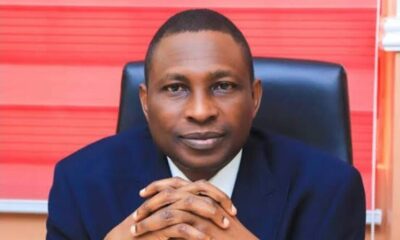

Corrupt Politicians Using Crypto Wallets To Launder Money — EFCC Chairman Olukoyede
-


Troops Kill 24 Terrorists In Borno, Repel Kebbi Bandits
-
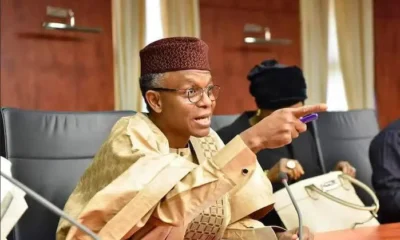

“Your Turn Will Come To Leave Power” — El-Rufai Tells Political Office Holders
-
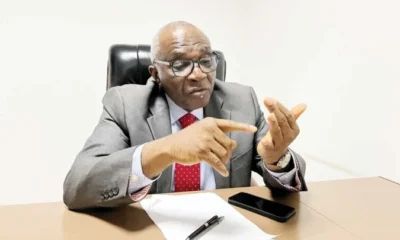

Buhari Couldn’t Have Won 2015 Election Without Tinubu’s Strategic Support — Bayo Onanuga
-


REVEALED: Trump’s Visa Clampdown Linked To Nigeria’s Refusal To House Asylum Seekers — TheCable Report
BIG STORY
Autonomy Standoff: Governors Get N4.5tn Local Government Funds One Year After Supreme Court Ruling
Published
2 hours agoon
July 11, 2025
Exactly one year after the Supreme Court granted full autonomy to Nigeria’s 774 local government areas, the Federal Government continues to route allocations through state governments.
An analysis by The Punch reveals that state governors have retained control over council funds amounting to N4.5tn, in defiance of the historic ruling that mandated direct disbursement of funds to local governments.
On July 11, 2024, the Supreme Court declared that local governments should receive their allocations directly from the Federation Account, ruling that the previous practice of passing funds through state governments was unconstitutional.
Following the verdict, the Federal Government set up an inter-agency committee to enforce the decision and instructed the Central Bank of Nigeria to create dedicated accounts for each of the 774 local government councils to enable direct payments.
But one year later, findings by The Punch indicate that the directive remains largely unimplemented.
Allocations to local governments are still being funneled through state governments, with the process hampered by delays and disagreements involving the Central Bank, state governments, local council authorities, and other stakeholders.
Data from the Federation Account Allocation Committee shows that between July 2024 and June 2025, a total of N4.496tn was allocated to local government councils.
This represents 24.87 per cent of the N18.074tn shared among the three tiers of government over the 12-month period.
According to the monthly communiqués released by FAAC, N337.02bn was allocated to LGs in July 2024, N343.70bn in August, N306.53bn in September, N329.86bn in October, and N355.62bn in November.
In December, local governments received N402.55bn, followed by N361.75bn in January 2025, N434.57bn in February, and N410.56bn in March.
Subsequent allocations included N387bn in April, N406.63bn in May, and N419.97bn in June.
Although the percentage of the total allocation going to local governments has remained steady, ranging between 24 and 25 per cent each month, the method of disbursement continues to breach the Supreme Court’s judgment.
An official at the Office of The Attorney General of the Federation, told The PUNCH that the AGF had done his bit, stating that the FG set up a committee to work on ensuring that the LGs were granted full autonomy.
Our source said, “The Attorney General is not the one in charge of disbursing of funds. The implementation committee raised by the Federal Government is chaired by the Secretary to the Government of the Federation. AGF is just a member there and he is not even the secretary. The Minister of Finance is there.
“The AGF has already gone to court and won the case and the moratorium, which was given to the governors before, was for them to conduct their local government elections, which I think all of them have complied with.
“The committee that was raised, ALGON is part of it, Labour is part of it. Those are the people to direct some of these questions to.”
The General Secretary of the Association of Local Governments Employees, Muhammed Abubakar, while speaking with The PUNCH on Thursday evening said the association was patiently waiting on the Office of the Secretary to the Government of the Federation to give updates on the documents submitted to President Bola Tinubu.
According to Abubakar, Tinubu listened to the concerns of the governors and mandated the Secretary to the Government of the Federation, George Akume, and the Attorney General of the Federation, Lateef Fagbemi (SAN) to work on the bottlenecks affecting the implementation of the judgment.
“No one has gone quiet. The process is still ongoing. The governors had some concerns and the President gave a listening ear to the governors. The President then mandated the SGF and AGF to work on the bottlenecks and concerns raised by the governors. They have communicated it to the Presidency. We are just waiting for the SGF to share updates on whether the President has received all the details.”
Confirming the delay in implementing the court ruling, the Gombe State, NLC chairman, Yusuf Bello, said nothing has changed nationwide.
He noted that appointed chairmen still lacked control over funds, while autonomy remained elusive.
According to him, only local government elections conducted by the FG can bring meaningful change and improve grassroots governance.
He said, “Does any chairman have the right to touch the money? It’s still pocketed, it’s the same scenario all over the nation.”
A source at the NULGE Gombe office under anonymity said that the challenge of implementation is nationwide.
He said, “I can confirm that all paper works have been completed. Implementation is not only a Gombe issue, it’s nationwide. Gombe is not one of the states where the executive puts eyes on the resources each LGA is allowed to spend freely.”
It was also gathered that the 16 LGs in Kwara State were yet to open accounst with the CBN.
The Chairman, NULGE, Kwara chapter, Seun Oyinlade, disclosed this in a telephone conversation with Punch correspondent in Ilorin on Tuesday.
“The local government chairmen are yet to open accounts with the CBN.”
Chairman of the state branch of the Nigeria Labour Congress, Comrade Saheed Olayinka said he was not aware that the LGs had opened the CBN account, adding that the accounts might be opened this month.
It was further gathered that the 44 LGs in Kano State were yet to comply with the directive of the CBN on the opening of accounts at the apex bank.
A reliable source at the Ministry for Local Government and Chieftaincy Affairs, who spoke on condition of anonymity, told The PUNCH, “To my knowledge, none of the 44 councils in the state has opened accounts with the CBN.
“We heard that the apex bank has opened an account for each of the local governments and what remains is to regularise the accounts, which is yet to be done,” the source said.
Our source accused the local government council chairmen and the NULGE officials of not making moves or efforts to ensure that the councils opened the accounts as directed by the apex bank because of what he described as personal benefits.
The Kano State Commissioner for Information and Internal Affairs, Ibrahim Waiya, confirmed that local governments in the state were yet to begin receiving statutory allocations directly from the FG.
He described the issue as national, adding that most northern states had not completed the internal requirements needed for full compliance, including setting up LG service commissions.
Waiya said Kano has made progress by establishing its own commission, chaired by Malam Ibrahim Jibrin.
He added that Governor Abba Kabir Yusuf had granted LGs autonomy to manage resources independently.
The Chairman, NULGE, Bayelsa State, Comrade ThankGod Singer, says states and local government councils all over Nigeria operated the Joint Account Allocation Committee.
Singer said several local government councils were yet to open dedicated accounts with the CBN but added that there was no problem in Bayelsa as the state government and the local government councils sat at JAAC to manage the allocations.
“JAAC is still being operated all over the country and here in Bayelsa State, we have no problem. Salaries are being paid, projects are going on and the state government is assisting the local governments in the payment of teachers’ salaries,” he stated.
According to The Punch, Benue State Government was yet to comply with the Supreme Court ruling.
Despite public claims by the government that autonomy had been implemented, findings by our correspondent indicated otherwise, with several local government chairmen in the state dismissing such claims as false and misleading.
Three council chairmen, who spoke on condition of anonymity, said the administration’s declaration of local government autonomy was a mere facade.
One chairman from Benue North East expressed disappointment with the recent statement by the state ALGON chairman, Maurice Orwourgh, who claimed that local councils in the state operated autonomously.
He stated, “If autonomy truly exists, why does the state government still allocate us N10m monthly as security votes? The least LGs receive is N385m monthly from federal allocation—why do we need state subvention?”
Another chairman from Benue North West lamented that none of the 23 LGAs has executed any meaningful project since the current administration came on board.
“Not even a culvert has been constructed,” he said, describing the government’s position as lip service.
From Benue South, a chairman linked the denial of LG funds to rising insecurity.
“What can N10m do as security vote in a month? It can’t even cover fuel costs,” he said.
Former governor Samuel Ortom also criticised the incumbent Governor Hyacinth Alia for flouting the Supreme Court judgment.
In a statement issued through his media adviser, Terver Akase, Ortom questioned why the governor is still controlling council finances, despite the court’s directive.
“That none of the 23 LGAs has constructed even a single culvert shows how starved they are of their funds,” he said.
The NULGE in Nasarawa State said the 13 LGs in the state had long opened their accounts, and ready to receive direct allocation from the FG.
The chairman of NULGE in the state, Adamu Sharhabilu, however, noted that the local councils were yet to receive their allocations directly from the FG.
He said, “At the moment, there are currently no obvious plans by the Nasarawa State government to shortchange the local government workers or frustrate the LG Autonomy implementation in the state.
“I can inform you that Governor Abdullahi Sule has been expressing his commitment to work towards ensuring that local government workers get what is due to them and also enjoy all the benefits of the LG autonomy.
“However, the FG has not given the LGs a single Kobo in Nasarawa. The money has always been sent to the joint accounts. No local government has received funds directly from the Federation Account.”
The Bauchi State chapter Chairman of NULGE, Muhammad Yunusa, said despite the Supreme Court’s judgment, local governments in the state have also not been able to open bank accounts with CBN.
He explained that the union was working tirelessly to ensure the implementation of the judgment.
“The union has submitted a memorandum to the Senate and plans to do the same with the House of Representatives, all on the matter.”
Also, the Jigawa State NLC chairman, Sanusi Maigatari, said LGs in the state had been receiving their funds from federal allocation prior to the apex court order.
However, he couldn’t shed light on whether the LGs had opened bank accounts with the CBN for direct allocation reception.
Maigatari advised the state government to fill gaps necessary for enhancement of financial and administrative autonomy of LGs for state development.
On his part, the NULGE chairman in Jigawa, Abubakar Shitu, echoed similar sentiments, stating that the state had almost achieved 95 per cent LG autonomy.
“Unlike in some other places, here in Jigawa, we don’t have issues with LG financial autonomy but administrative autonomy,” he said.
He highlighted some deductions made by the state government, including two per cent contribution to Sule Lamido University and one per cent to the state Local Government Service Commission, which he clarified were duly recognised by the law of the state.
“These deductions include 2.5 per cent for the Ministry of Local Government. Despite these deductions, Jigawa State LGs seem to be functioning relatively autonomously,” he stated.
Shitu also emphasised that the problem with LG autonomy lied with the FG, citing the lack of a Certified True Copy of the Supreme Court judgment.
However, while other LGs lament the delay in implementation of the ruling, the Adamawa State Chairman, ALGON, and Chairman, Toungo LG, Suleiman Gankuba, confirmed to The PUNCH that councils received federal allocations directly from the FG.
“Governor Ahmadu Fintiri granted local governments autonomy before the Supreme Court judgment, so for us in Adamawa, councils’ autonomy is not a new issue to us,” he said.
The state’s Commissioner of Finance, Augustina Wandamiya, told The PUNCH, “Adamawa is the first state to implement local autonomy without waiting for the Supreme Court judgment because Governor Fintiri believes in the rule of law and separation of powers,” she said.
SANs fault non-implementation
Some of Nigeria’s most prominent constitutional lawyers have faulted the continued disregard for the Supreme Court’s ruling on local government autonomy, one year after the landmark judgement was delivered.
Senior Advocates of Nigeria, in separate interviews, described the non-compliance as a blatant affront to the rule of law, with some calling out both the Federal and state governments for frustrating enforcement.
Professor Mike Ozekhome (SAN) condemned what he described as a deliberate effort by state governors to circumvent and disobey the Supreme Court’s judgement.
He noted that the ruling was unambiguous in declaring that allocations from the Federation Account under Section 162 of the 1999 Constitution should no longer be routed through the State Joint Local Government Account, but paid directly to the councils.
“The judgment was clear, as clean as a whistle. It was meant to end the practice where governors deduct funds at source, starving the third tier of government of the resources needed to serve grassroots communities,” he said.
Ozekhome also pointed to the power imbalance between state governors and local government chairmen, many of whom, he argued, never truly won elections but were appointed and remain beholden to the governors.
“The story has not changed. The Supreme Court judgement is so far consigned to mere Law Reports,” he added.
Femi Falana (SAN) took aim at the Federal Government, particularly the Attorney General of the Federation, Mr Lateef Fagbemi (SAN), whom he accused of failing to enforce the very judgment he once celebrated. Falana questioned why the AGF had not invoked the provisions of the Constitution to compel compliance, especially after publicly warning that non-compliance would amount to treason.
“The Central Bank asked LGs to open accounts, and they did. Then they were told to provide two years of audited reports. But how can councils produce audit reports for periods when they never directly handled funds?” he queried.
Citing Section 287 of the Constitution, Falana maintained that judgments of the Supreme Court are binding on all persons and authorities and must be obeyed regardless of convenience or politics.
In contrast, Professor Itse Sagay (SAN) offered a nuanced view, admitting that while the judgment had good intentions, it contradicted existing constitutional provisions.
He explained that the Constitution currently recognises the State Joint Local Government Account, and until an amendment is made, direct payment to LGs may technically breach the law.
“The Supreme Court meant well, but it ignored the reality of what the Constitution provides. The Constitution has to be amended before that judgment can be fully and legitimately enforced,” he said.
Another senior lawyer, Adedayo Adedeji (SAN), described the ruling as a landmark affirmation of local government autonomy but lamented its hollow implementation.
He said that state governments remain unwilling to give up their control, both politically and financially, over local councils.
“The states are still running caretaker committees and controlling joint accounts in violation of both the Constitution and the judgment,” he stated.
Adedeji also placed part of the blame on the Federal Government, noting that it is the constitutional duty of the Attorney General to ensure enforcement.
“What we are seeing is a lack of political will by both tiers of government. Until they commit to respecting constitutional governance, this ruling will remain a legal milestone with no practical impact,” he added.
Also, Paul Obi (SAN) stated, “It’s quite unfortunate that despite the clear provisions of the constitution on this subject matter and the extant judgment of the Supreme Court on this, the governors are deliberately and intentionally kicking against the judgment and observing the directives more in breach than in conformity.
“It’s quite sad, but that’s what happens when you have politicians that are self-centered and fight only for their personal interest and not the common good. Truly sad.”
Credit: The Punch
BIG STORY
Corrupt Politicians Using Crypto Wallets To Launder Money — EFCC Chairman Olukoyede
Published
2 hours agoon
July 11, 2025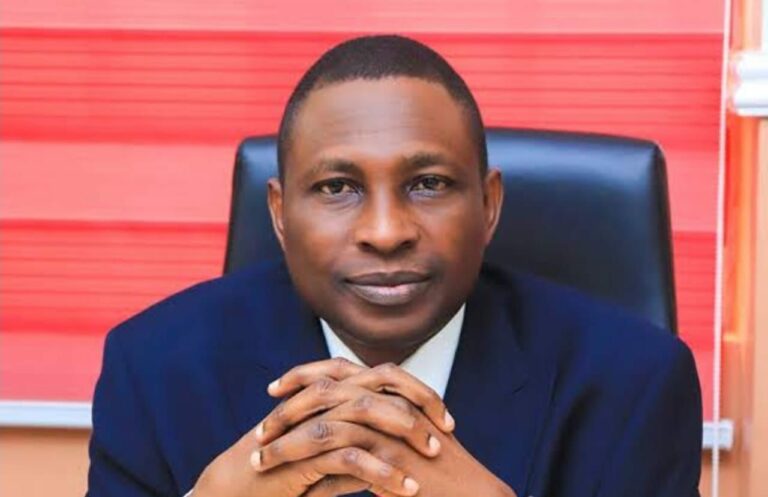
The Chairman of the Economic and Financial Crimes Commission, Ola Olukoyede, has alerted the public that some corrupt Nigerian politicians are now concealing their illegal wealth in cryptocurrencies to avoid detection by anti-graft agencies.
Olukoyede explained that the EFCC had identified a rising pattern in which dishonest public officials were using cryptocurrency wallets to hide embezzled funds and carry out illicit financial transactions.
He disclosed this on Thursday during an event marking Africa Anti-Corruption Day.
The event, monitored by The PUNCH, was held concurrently in Abuja, Lagos, and Ibadan, Oyo State.
Other speakers at the gathering expressed concern that Nigerians frequently fall victim to crypto-related scams, including the CBEX fraud, which saw citizens lose more than N1.3tn.
Olukoyede stated, “Virtual asset fraud is on the rise. Our findings show that fraudulent politicians are already perfecting schemes and hiding their loot in cryptocurrencies to beat the investigative blackness of anti-corruption agencies. Stolen funds and unexplained wealth are being warehoused in wallets and payment for services are being done through this window.”
He cautioned that although virtual assets have revolutionised global financial transactions, they have also opened new channels for money laundering and economic crimes.
He said, “Technology is moving at a supersonic speed around the world. The advent of virtual assets is a response to one of the qualities of money as a store of value like it is known in our elementary economies. However, as with every progressive innovation, fraud starts to usually evolve, evolve ways of perverting their genuine purposes.”
Olukoyede noted that the EFCC was not overwhelmed by these new methods, as ongoing training and intelligence collaboration had empowered the commission to detect and pursue such activities.
“But for us in the EFCC, virtual asset fraud and investment scams are not hard nuts to crack. Proactive and broad-based training and intelligence are bringing fraudulent schemes to the fore,” he said.
At the Lagos event, Olukoyede, represented by Chief of Staff/Lagos Zonal Director, Lagos Zonal Directorate 1, C. E. Michael Nzekwe, noted that virtual assets had become powerful tools for fraudsters and corrupt officials.
He observed that crypto fraud was growing both in Nigeria and across Africa, with criminals taking advantage of the anonymity and borderless features of blockchain platforms.
He pointed out that although virtual assets were created for convenience and as a value store, some individuals had repurposed them for illegal use.
Speaking in Ibadan, where the event was held at the Jagz Hotel conference hall, Olukoyede, represented by Acting Zonal Director of the Ibadan Zonal Directorate, Hauwa Ringin, said virtual asset fraud was spreading rapidly across Africa, much like investment fraud.
In Abuja, Muhammad Abdullahi, Deputy Governor of Economic Policy, representing Central Bank of Nigeria Governor Yemi Cardoso, revealed that Nigeria had witnessed a surge in crypto transactions, raising systemic financial risks.
He said over $56bn worth of crypto transactions were recorded in Nigeria between July 2022 and June 2023.
He said, “In Nigeria, over $56bn in crypto-related transactions were recorded between July 2022 and June 2023, making the country Africa’s digital transaction leader.”
However, he warned that this expansion had negative consequences.
He cited the CBN’s 2024 Financial Stability Report, which showed a 45% increase in financial fraud, with 70% of recorded losses linked to digital platforms and unregulated virtual asset services.
“Furthermore, over 30 Ponzi-style investment schemes exploiting digital currency narratives have been flagged by the SEC and other agencies,” he said.
He warned that these trends could tarnish Nigeria’s image on the international financial scene.
“These developments pose major risks, including loss of consumer confidence, weakening of financial integrity, and reputational challenges for Nigeria in the global financial system,” he said.
Cardoso noted that the CBN and the Securities and Exchange Commission had established a joint task force to oversee the virtual asset space, with backing from the EFCC and the Nigerian Financial Intelligence Unit.
He said, “We have intensified our regulatory and supervisory responses in several critical areas. Namely, on virtual accounts, following an extensive review of the operations of virtual accounts by deposit money banks and their fintech partners, we uncovered systemic weaknesses. These include poor KYC, knowing of customer practices, and insufficient transaction monitoring. We have acted to ensure that all firms strengthen KYC processes, improve oversight of fintech partnerships, and adhere to AML-CFT obligations.”
Cardoso also said the CBN was collaborating with the EFCC to develop a National Virtual Asset Wallet to store confiscated digital assets.
He emphasised the need for public education, particularly targeting youths who are often misled by fraudulent investment platforms.
“Technology-driven financial crimes are borderless, faceless, and fast-moving. Combating them requires strong institutions and coordinated action,” he said.
In Lagos, anti-fraud expert Kaina Garba explained key concepts surrounding virtual assets.
He described cryptocurrencies and tokens as digital forms of value that could be transferred online but are different from traditional money or securities like stocks.
Garba cautioned that the growth of digital finance had led to new crimes, including Ponzi schemes disguised as crypto projects, fake coin launches, phishing of crypto wallets, and laundering funds via crypto mixers.
“Criminals now exploit virtual assets to defraud unsuspecting investors. Many disappear with people’s hard-earned money after marketing fictitious tokens or projects,” he said.
He noted that while crypto had been unregulated in Nigeria in the past, the new Investment and Securities Act 2025 had created a legal framework for oversight.
He said the EFCC had responded by enhancing cybercrime units, investing in digital forensics, and increasing local and global collaboration.
Speaking for the SEC, Divisional Head of Legal and Enforcement, John Achile, reaffirmed the agency’s responsibility under the 2025 Investment and Securities Act.
“The SEC has a dual responsibility: investor protection and market development. With digital assets now legally recognised, we are regulating this space through structured incubation programmes and licensing procedures,” Achile stated.
He said the SEC had formed a Digital Asset Division and designed two streams—accelerated and managed—for evaluating applicants’ business models before granting licences.
“We do not just issue licences. We engage prospective exchanges or service providers to understand their operations and determine compliance before approval,” he explained.
In Ibadan, during a lecture themed “Understanding Virtual Asset and Investment Fraud,” criminology professor Oludayo Tade said, “People fall victim to fraud. What can we do? We need to ensure that anything too good to be true is a red flag. It’s a red flag because you know that we are in Nigeria and you know the condition of things. You know that even if you invest in a bank, the returns cannot be 50 per cent and somebody is offering you that to happen within a week. Another thing that they do is also to use the image, the reputation of individuals and organisations to launder their fraudulent tactics. But to prevent virtual fraud, virtual assets, you need to increase and improve on awareness level. How many Nigerians are aware of it? I’m very sure that those who fell victim to CBEX would find another scheme that is coming and will still join because people are looking for opportunities.”
In a goodwill message, Oyo State Sector Commander of the Federal Road Safety Corps, Rosemary Alo, represented by DCC OPS, Olugbesan, noted that joint efforts to monitor vehicle movement, especially against unregistered, fake, or cloned number plates, had helped disrupt illicit financial flows and aided the recovery of criminal proceeds.
BIG STORY
Troops Kill 24 Terrorists In Borno, Repel Kebbi Bandits
Published
4 hours agoon
July 11, 2025
Troops of Operation Hadin Kai have killed 24 Boko Haram/ISWAP terrorists in coordinated operations across Borno and Adamawa states.
The defence operations, which spanned between July 4 and 9, featured ambushes, clearance patrols, and close air support in Platari, Komala, Kawuri, Madarari, Leno Kura, Ngoshe-Gava, Ngoshe-Ashigashiya, Amuda-Gava, Bula Marwa, and Pambula, Ngailda, Manjim, and Wulle villages.
Also, the 223 Light Battalion successfully repelled a large-scale attack by over 400 bandits on Ribah town in Kebbi State.
The swift military response in Kebbi led to the neutralisation of several bandits, recovery of weapons, and return of normalcy to affected communities.
A statement by the Acting Deputy Director, Army Public Relations Headquarters, Theatre Command Operation Hadin Kai, Capt Reuben Kovangiya, on Thursday, said the operations in Borno involved a collaboration between land and air components of OPHK, Civilian Joint Task Force and hunters.
The statement read, “In continuation of the series of coordinated offensive operations across the North East Theatre of operations, troops of Operation Hadin Kai (OPHK), bolstered by close air support from the Air Component and collaboration with Civilian Joint Task Force and hunters, have carried out successful kinetic operations against Boko Haram/ISWAP terrorists in theatre between 4 to 9 July 2025, eliminating several terrorists.
“In one of the ambushes conducted at Platari on 4 July 2025, the gallant troops, while lying in wait, made contact with JAS/ISWAP terrorists mounted on bicycles moving from the Sambisa Forest axis to the Timbuktu Triangle.
“The terrorists were immediately subdued with heavy fire, leading to the neutralization of three terrorists.”
It added that “Following intelligence on movements of the insurgents around Komala general area, troops sprang another ambush on the terrorists, neutralising another fighter.
“On exploitation of the general area, troops recovered motorcycles and spare parts, knapsack sprayers, pesticides, and terrorists’ food items.”
The statement said troops conducted a night ambush on the same day at terrorists’ hideouts around the Kawuri general area in Konduga Local Government where they came into contact with the insurgents.
“Consequently, two terrorists conveying logistics were immediately eliminated, while others fled with gunshot wounds. Troops also recovered packets of salt, food seasoning, detergents, and other sundry items,” it said.
It added, “In the same vein, troops on 5 July 2025, intercepted terrorists attempting to access the Madarari Internally Displaced Persons (IDPs) camp in Konduga Local Government Area.
“The troops swiftly engaged the insurgents, killing one terrorist, while others escaped with traces of gunshot wounds. Troops subsequently recovered several rounds of ammunition during the exploitation of the area.
“In another development, troops conducted a fighting patrol to terrorists’ enclaves at Leno Kura. Resultantly, the troops came into contact with the insurgents and engaged them with simultaneous gunfire from different directions.
“Accordingly, three terrorists met their waterloo, while troops continued to exploit the area.”
It stated that “Furthermore, on 6 July 2025, troops carried out a night ambush at a suspected terrorists’ crossing point along the roads Ngoshe-Gava, Ngoshe-Ashigashiya, as well as Amuda-Gava areas. Troops made contact, and an insurgent was neutralised while others fled.
“On 7 July 2025, troops sprang another ambush following an intelligence report close to Sabsawa village. During the operation, troops made contact with terrorists’ logistics suppliers and successfully neutralised two insurgents.
“On the exploitation of the area, the gallant troops recovered bicycles, sacks of slippers, several torchlights, batteries, detergents, salt, and rubber shoes, amongst other sundry items.”
Speaking on the July 8 operations, the statement said, “Troops in conjunction with the Civilian Joint Task Force, under close air support provided by the Air Component of OPHK, conducted clearance operations at Bula Marwa, a known ISWAP/JAS enclave.
“In the course of the operation, the troops eliminated an insurgent and recovered a gun, and terrorists’ uniforms, while their life-supporting structures were totally destroyed.
“Additionally, troops, in a joint operation with hunters and the Civilian Joint Task Force, conducted a fighting patrol at terrorists’ hideouts at Pambula village in Madagali Local Government Area of Adamawa State.
“During the patrol, contact was made with JAS/ISWAP terrorists, who were immediately engaged with a high volume of fire, forcing the terrorists to disperse in disarray.
“Consequent upon the firefight, the troops neutralised a terrorist, recovering four motorcycles and his weapon. The determined troops continued exploiting the general area to rid it of any terrorist activities.”
Also on July 8, the statement said troops, at Bula Marwa, neutralised a terrorist fighter, while others fled, adding that a gun and terrorists’ uniforms were recovered.
“On 9 July 2025, troops in joint operations with the Civilian Joint Task Force conducted a clearance operation in the JAS/ISWAP enclave at Tangalanga and Bula Marwa.
“After a heavy firefight, three insurgents were eliminated. Terrorists’ life-supporting structures in the camp were also destroyed completely. Troops recovered six AK 47 rifles, 47 magazines and ninety rounds of 7.62mm ammunition during the exploitation of the area.
“In furtherance of the offensive operations, troops in conjunction with CJTF conducted an ambush at Ngailda, Manjim and Wulle villages, where contact was made with the insurgents.
“Following the contact, troops successfully eliminated six terrorists while others fled in disarray. Items recovered by the troops during exploitation included motorcycles and bicycles,” it added.
Reuben said the killing of 24 insurgents with close air support underscored the determination, collaboration, and concerted efforts by the troops of Operation Hadin Kai to ensure terrorists were placed on the back foot, to create a conducive environment for socio-economic activities to thrive in the North East region.
The Nigerian Army’s 223 Light Battalion, Zuru, also successfully repelled a large-scale attack by over 400 armed bandits on Ribah town in Danko Wasagu Local Government Area of Kebbi State.
The daring operation, which took place on Wednesday, saw the troops respond swiftly to the invasion, as they engaged the attackers in a fierce gun duel that lasted several hours.
Eyewitnesses described the scene as a battlefield, with the superior firepower and tactics of the army ultimately forcing the bandits to retreat in disarray.
Military sources confirmed that many of the bandits were neutralised during the exchange, while others fled with injuries, abandoning a cache of weapons and ammunition.
The Director of Security at the Kebbi State Cabinet Office, Alhaji Abdulrahman Zagga, while addressing newsmen on Thursday, lauded the courage and professionalism of the soldiers.
“The troops displayed uncommon bravery. Their swift response and combat efficiency turned what could have been a major disaster into a remarkable victory,” he said.
Zagga also applauded the Nigerian Air Force for its timely intervention and aerial support, which he said inflicted heavy casualties on fleeing bandits and disrupted their escape routes.
“The situation is now fully under control. The people of Ribah can breathe a sigh of relief thanks to the coordinated efforts of our security forces,” he added.
Intelligence reports suggested the attackers were part of the same criminal syndicate responsible for recent attacks in Niger State.
In a related development, troops from the Dukku Barracks repelled another bandit assault on Mera in Augie Local Government Area.
The attackers, identified as Lakurawa bandits, attempted to rustle cattle but met stiff resistance from the Nigerian Army, which forced them to flee empty-handed.
Reacting to the successful operations, Governor Nasir Idris commended the gallantry of the security personnel and reaffirmed his administration’s unwavering commitment to strengthening security across the state.
“These victories are proof that with sustained support and collaboration, our security agencies can defeat banditry and restore peace to our communities,” the governor stated.
Just two days earlier, a joint security operation in the same Danko Wasagu axis led to the rescue of six abducted persons and the recovery of stolen livestock.
Residents of Ribah and Mera expressed relief and gratitude, calling on authorities to maintain the current tempo to prevent future attacks.
Most Popular
-

 BIG STORY3 days ago
BIG STORY3 days agoJUST IN: ASUU Suspends Strike As Federal Government Pays June Salaries
-

 BIG STORY2 days ago
BIG STORY2 days ago“JAPA”: Canada Increases Minimum Proof Of Funds To N17m For Immigrants
-

 BIG STORY2 days ago
BIG STORY2 days agoUK Introduces eVisas For Nigerian Study, Work Visa Applicants
-

 BIG STORY3 days ago
BIG STORY3 days ago“JAPA”: US Embassy Begins Screening Nigerian Students’ Social Media Accounts
-

 BIG STORY4 days ago
BIG STORY4 days agoJUST IN: Several Passengers Injured As Commercial Bus Somersaults On Lagos Third Mainland Bridge [PHOTOS]
-
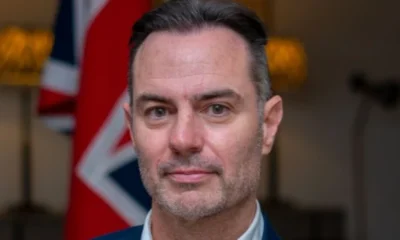
 BIG STORY5 days ago
BIG STORY5 days agoUK Grants Duty-free Access To 3,000 Nigerian Products Under New Trade Scheme
-

 BIG STORY1 day ago
BIG STORY1 day agoTunji-Ojo Meets US Envoy Over New Visa Policy, Says FG Will Curb Overstay By Nigerians
-
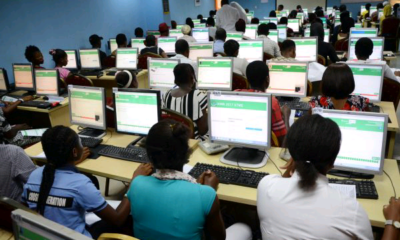
 BIG STORY3 days ago
BIG STORY3 days agoJUST IN: JAMB Sets 150 As Cut-Off Mark For Universities









